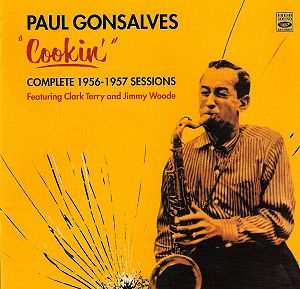1. It Donít Mean A Thing
2. Take Nine
3. Everything Happens To Me
4. Donít Blame Me
5. Festival
6. Clarkís Bars
7. Daddy-Oís Patio
8. Blues
9. Impeccable
10. Paulís Idea
11. Phat Bach
12. Milli Terry
13. Funky
14. The Girl I Call Baby
15. Falmouth Recollections
16. The Way You Look Tonight
17. Foofy For President
18. The Man From Potterís Crossing
19. Dance Of The Reluctant Drag
20. Empathy, For Ruth
Paul Gonsalves - Tenor sax
Clark Terry - Trumpet
Porter Kilbert - Baritone sax (tracks 1-4),
alto sax (tracks 15-20)
Junior Mance - Piano (tracks 1-4)
Chubby Jackson - Bass (tracks 1-4)
Eugene Miller - Drums (tracks 1-4)
Willie Jones - Piano (tracks 5-14)
Jimmy Woode - Bass, vocals (tracks 5-20)
Sam Woodyard - Drums (tracks 5-20)
Mike Simpson - Flute (tracks 15-20)
Ramsey Lewis - Piano (tracks 15-20)
Duke
Ellington certainly knew how to pick them.
Think of all the brilliant musicians he chose
for his orchestra: from Ben Webster to Cootie
Williams, from Hodges to Carney, from Nance
to Nanton. This album features just two of
the many instrumentalists whose individuality
appealed to Ellington, so that Paul Gonsalves
was in Duke's band for 24 years and Clark
Terry was there for eight.
Many
saxophonists - especially tenorists - sound
like one another, but Gonsalves was unique.
He might have owed something to Ben Webster
(his predecessor in the Ellington orchestra)
and perhaps to Don Byas, but his style was
his very own. A self-effacing musician, Paul
made his playing look effortless but his approach
was entirely individual. His oblique, sidelong
style of soloing arose from his adventurous
handling of harmony - often seeming as if
he was sliding out of tune but his solos always
made perfect musical sense. He was virtually
an avant-garde player who didn't sound at
all way-out, and few subsequent tenorists
have been able to match his style - although
Tony Coe is the nearest comparison.
Paul
Gonsalves is best known for his marathon 27-chorus
solo on Diminuendo and Crescendo in Blue
at the 1956 Newport Jazz Festival and this
shows one side of his genius. But it is good
to hear other aspects of his playing on CDs
like this, which brings together three small-group
sessions from 1956 and 1957, originally issued
on the LPs The Jazz School, Cookin'
and The Colourful Strings of Jimmy Woode.
In fact Paul's solo on Festival is
very reminiscent of his Newport performance,
consisting of several swinging blues choruses
which even include phrases he used at Newport.
His solo is driven along by bassist Jimmy
Woode and drummer Sam Woodyard's trademark
offbeat rimshots.
However,
other tracks show Paul in different lights.
For example, Everything Happens To Me
and Don't Blame Me (where Clark Terry
takes a back seat) display Gonsalves' ability
to play an extended ballad solo in the Coleman
Hawkins tradition, with lyrical cadenza endings.
At the start of the former track, Paul makes
the tenor sax sound like a clarinet in delicacy
and tone. On the ballad The Girl I Call
Baby, his saxophone matches Ben Webster
for warmth and breathiness.
Clark
Terry is the ideal companion, with his own
distinctive trumpet style: silvery but mellow
in tone, with a staccato attack which adds
impact to his solos. On Blues (track
8) he sounds as excitable as Roy Eldridge.
Paul's Idea and Phat Bach contain
good examples of Terry's wonderfully puckish
horn playing. The former track also illustrates
another pleasure of this particular session:
the playful pianism of Willie Jones. His joyful
madness in Funky is a mixture of reckless
excess and bluesy funkiness.
The
sound quality differs on the three sessions.
The first one sounds slightly boxy and the
last one a bit too echoey but the middle session
(tracks 5 to 14) is fine. Many of the tracks
are easygoing blues tunes but Gonsalves and
Terry make them varied as well as full of
pleasant surprises. In some ways, these recordings
may remind you of those earlier small-group
sessions that members of the Ellington band
recorded in the late thirties and early forties.
As those sessions produced some first-class
jazz, this suggests the high quality of the
music on this album.
Tony
Augarde
